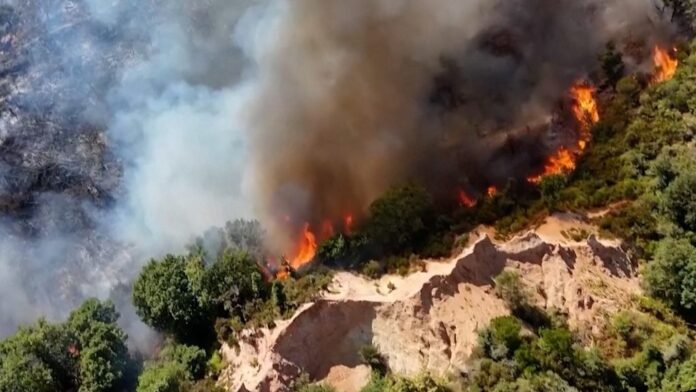Greece Europe Wildfire Crisis Worsens Amid Relentless Heatwave
The Greece Europe wildfire crisis has reached one of its most dangerous points this year, with flames devouring forests, villages, and farmland across the mainland and islands. Nearly 5,000 firefighters, supported by 33 aircraft, have been battling the infernos since dawn, but strong winds, extreme heat, and parched landscapes are fueling the destruction.
Officials say this week marks the toughest days yet of the 2025 wildfire season. On a single day, authorities recorded 82 new fires a number firefighting veterans are calling “exceptionally high” for any country in Europe.
Heat, Wind, and Dryness: A Perfect Storm
The relentless combination of hot, dry conditions and high winds has created an explosive environment for fires to spread. Evacuations have been ordered in multiple areas, including the western city of Patras, where two massive blazes continue to burn on the Peloponnese peninsula.
“It looks like doomsday. May God help us,” said volunteer Giorgos Karvanis, who traveled from Athens to assist firefighters. Speaking to Reuters, he described how entire neighborhoods have been forced to flee in minutes.

Small Victories in a Fierce Battle
While the situation is dire, there have been a few encouraging signs. A shift in wind direction has pushed the fire away from Patras and back toward areas that have already burned, slowing its spread.
In addition, two water-bombing helicopters have made a visible difference in suppressing part of the blaze, according to local reporters on the ground.
Still, thousands remain displaced. On Tuesday, more than 7,700 people were ordered to evacuate near Patras. By Wednesday, new evacuation orders had been issued for villages in Preveza in the northwest, as well as on the islands of Zakynthos and Chios.
On Chios, the coastguard rescued dozens of people trapped by smoke at the small harbor of Limnia. Thirteen firefighters have been treated for burns and other injuries so far.
Europe Feels the Heat
The Greece Europe wildfire crisis is part of a larger heatwave sweeping across southern Europe. Italy, France, Spain, Portugal, and parts of the Balkans are also under heat alerts, with temperatures expected to soar above 40°C (104°F) in some regions.
This summer, wildfires have already caused record levels of smoke and greenhouse gas emissions, according to the EU’s Copernicus climate monitor. The agency warns that climate change is intensifying the frequency and severity of fire seasons in Europe.
Spain’s Deadly Wildfires
Spain has been particularly hard-hit. In the Madrid suburb of Tres Cantos, an employee of an equestrian center died from fire-related injuries. In Castile and Leon, another man lost his life while trying to combat the flames.
In southern Spain’s Andalusia region, about 2,000 people were evacuated from hotels and homes near Tarifa’s famous beaches. Dozens of fires in Castile and Leon have threatened treasured landmarks, including Las Médulas, a UNESCO World Heritage site known for its ancient Roman gold mines.
Regional leader Alfonso Fernández Mañueco has pledged swift restoration efforts once the fires are out, promising to return the site “to its full glory as soon as possible.”
Rescue Efforts Under Strain
Spanish Prime Minister Pedro Sánchez has urged citizens to remain vigilant, warning that the risk of forest fires remains “extreme.” Emergency crews, he said, are “working tirelessly” to contain the blazes.
In Galicia, firefighting is being hampered by a dangerous mix of low rainfall and high winds. Residents worry not only for their homes but also for local wildlife. “I’m so sorry because there are lots of animals up there that will also get burned if no one rescues them,” said Mari Carmen, a resident of the region.
International Assistance and Coordination
Back in Greece, authorities have requested urgent help from fellow European Union members. Four firefighting aircraft have been applied for through the EU Civil Protection Mechanism, which coordinates emergency resources across member states.
Fire brigade spokesman Vassilis Vathrakogiannis has warned that the danger is far from over: “Today will be another very difficult day, as wildfire risk for most of the country’s regions will be very high.” Temperatures in parts of Greece are forecast to reach 34°C (93.2°F).
Tourism and Economy Under Threat
Beyond the immediate human and environmental toll, the Greece Europe wildfire crisis is also threatening tourism — a major economic driver for both Greece and Spain. Popular destinations such as Zakynthos, Chios, and Tarifa have seen mass evacuations, with some travelers abandoning holidays mid-trip.
Damage to cultural heritage sites, beaches, and natural reserves could have long-term consequences for local economies, especially if recovery efforts are slow or insufficient.
Climate Change: The Bigger Picture
Scientists say that the Mediterranean basin is warming faster than the global average, making heatwaves and wildfires more likely and more severe. Without significant global action to reduce greenhouse gas emissions, events like the current Greece Europe wildfire crisis could become an annual reality rather than a rare catastrophe.
A 2023 report by the European Environment Agency warned that wildfires could burn twice as much land in southern Europe by mid-century if climate change continues unchecked.

Looking Ahead
For now, the focus remains on saving lives and preventing further destruction. Local volunteers, firefighters, coastguard crews, and international reinforcements are racing against the clock. The stories emerging from the front lines are filled with both heartbreak and resilience.
While the flames may eventually die down, the challenges of rebuilding, supporting displaced communities, and preparing for the next fire season will remain. The Greece Europe wildfire crisis is a stark reminder that in the age of climate change, fire seasons are no longer just natural disasters — they are political, economic, and humanitarian challenges rolled into one.
Internal link — See our latest report on climate change impacts in Europe

